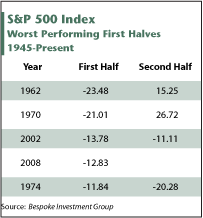By Jennifer Yousfi
Managing Editor
Just days after a key U.S. stocks index posted its worst month since the Great Depression, three global investment banks are predicting the biggest second-half rally in more than 25 years.
Market strategists at Deutsche Bank AG (DB), Lehman Brothers Holdings Inc. (LEH) and UBS AG (UBS) are predicting that the Standard & Poor's 500 Index will soar 25% to 29% in the last six months of the year - making for the biggest rebound in that closely watched index of U.S. stocks since 1982, when Ronald Reagan was in the White House.
Deutsche Bank Chief Strategist Binky Chada is the most bullish of the lot, betting the S&P 500 will rocket 29% in the year's second half, to close at 1,650 before January. Lehman Chief Global Strategist Ian Scott is calling for U.S. stocks to rumble 27%, sending the S&P to 1,630. And UBS analysts David Bianco predicts that this key index will advance at least 25% over the next six months, according to Bloomberg News.
The second half rebound in U.S. stocks "is going to be one of the greatest roars we've seen," Bianco told Bloomberg. "The market has way too many fears baked into the valuation right now. The fear out there is the earnings are about to collapse and interest rates are about to surge on inflationary fears. Neither is going to happen."
That's not a universal view.
The Struggles of U.S. Stocks
The S&P 500 closed yesterday at 1,252.31, down 10.59 points. The index closed at 1,280 on June 30, which represented a plunge of 12.83% for the year's first half. That performance included an 8.6% drop for the month, the worst showing for June since 1930, and the worst decline for any month since September 2002, Bespoke Investment Group said in a recent research report.
According to a survey of 10 U.S. equity strategists surveyed by Bloomberg, the S&P 500 will rebound 18% by January, which would take the index to 1,515. But those forecasts are based on an estimate that U.S. corporate profits will leap by 50% in the fourth quarter of the year - a major improbability given that they've declined for more than a year, some analysts say.
The last time corporate profits fell this much and were this dismal was in 2001, immediately after the implosion of the Internet stock bubble, and it took three consecutive quarters of profit increases for U.S. stocks to rebound. Even if the current earnings estimates prove accurate this time around, corporate profits still will be lower than they were in 2006, making it difficult to justify the lofty stock-price projections now being put forth by an increasingly bullish Wall Street.
Indeed, as the second-quarter earnings season kicks off this week, it's a gloomy picture as Thomson Reuters now estimates that earnings declined by an average of 11.1% during the period.
As notoriously unreliable Wall Street profit projections usually are, analysts' overall market prognostications are even less credible. Since 2000 alone, equity strategists' annual forecasts for U.S. stocks have been off by an average of 14 percentage points, according to a separate survey by Bloomberg.
At the outset of this year, analysts told investors to anticipate an 11% advance in the S&P 500, taking the index to 1,634. Instead, this U.S. stocks measure is down 14% so far for the year and 20.5% from its October trading high of 1,576.09 - dropping the S&P down firmly into bear-market territory.
More Bearish on U.S. Stocks
For U.S. stocks to match the predictions of Deutsche Bank and Lehman, the S&P 500 Index would have to turn in its best second-half performance in more than 50 years [For more detail, please see the accompanying chart]. To just achieve the 25% gain projected by UBS, the S&P would very nearly have to equal the 26.72% second-half gain notched in 1970 - the index's biggest second half in 50 years.
"A monkey with an abacus is probably better at the end of the day," Peter Sorrentino, a senior money manager at Huntington Asset Advisors, told Bloomberg. "To read the strategists' input is intriguing and thought-provoking, but at the end of the day, you'd better have your own tools. We're nowhere near as optimistic as some of the forecasts."
And there also are some big names lining up with this more bearish view on U.S. stocks.
Abhijit Chakrabortti, chief global equity strategist for Morgan Stanley (MS), wrote in a report yesterday (Monday) that the S&P 500 is still too high relative to earnings and could drop as much as 8.9% - reaching 1,150 - if inflation continues to pick up, Bloomberg reported.
Meanwhile, Richard Bernstein of Merrill Lynch & Co. Inc. (MER) thinks the broad-based U.S. stocks index will rise, but not nearly as much as some of his rivals. Bernstein's target is 1,400 in the next 12 months, according to his July 3 note to clients.
Money Morning Investment Director Keith Fitz-Gerald said we're not in the business of trying to second-guess the markets, but he understands what UBS and Lehman are trying to do.
"Investment banks want to look positive and keep their clients invested," Fitz-Gerald said in a telephone interview yesterday. "I can understand their reasoning, but I certainly don't agree with it."
Fitz-Gerald warned that it's not quite time yet to jump on the bulls' bandwagon, saying instead that now is the time to focus on how to profit in a bear market.
"I'm cautiously optimistic that we will get some gains as the election year phenomenon starts to take hold," said Fitz-Gerald. "But now is the time for consistency."
Cautioned Fitz-Gerald: "It's not time to put the pedal to the metal."

News and Related Story Links:
-
Money Morning:
The Five Secrets to Succeed at Bear Market Investing


